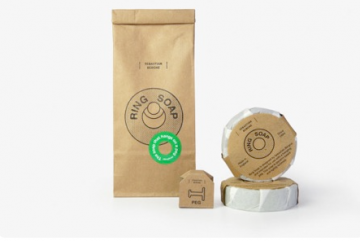Natural Soaps: Natural soaps are typically handmade and crafted using natural ingredients. They are often created through processes like cold process or melt and pour, and they may contain additives like essential oils, herbs, and natural colorants. Here are some key points to consider:
Ingredients: Natural soaps are made from plant-based oils and fats, and they often include natural additives for scent, color, and texture. These ingredients are usually recognizable and free from synthetic chemicals.
Benefits:
- Gentleness: Natural soaps are generally gentler on the skin because they lack harsh chemicals and synthetic additives.
- Moisturizing: Many natural soaps include nourishing oils and glycerin that can help moisturize the skin.
- Essential Oils: Natural soaps may incorporate essential oils, which can provide aromatherapy benefits.
Environmental Impact:
- Biodegradable: Natural soaps are often biodegradable and don’t contribute to water pollution.
- Sustainable: Some natural soaps are made using sustainable and responsibly sourced ingredients.
Personalization: Natural soap-making allows for creativity in terms of ingredients, scents, and designs.
Commercial Soaps: Commercial soaps are mass-produced and widely available in stores. They are often created using a process called “melt and pour,” which involves melting pre-made soap bases and adding fragrances, colorants, and other additives. Here’s what to consider:
Ingredients: Commercial soaps may contain a mix of natural and synthetic ingredients. They might include detergents, synthetic fragrances, and artificial colorants.
Benefits:
- Convenience: Commercial soaps are readily available in stores and online.
- Variety: There is a wide range of scents, colors, and formulations to choose from.
- Price: Commercial soaps can be more affordable than some handmade natural soaps.
Environmental Impact:
- Additives: Some commercial soaps might contain microplastics, harsh surfactants, and other chemicals that can be harmful to the environment.
- Packaging: Consider the packaging – some commercial soaps come with excess packaging.
Personalization: Limited options for personalization compared to natural soaps.
Making Your Choice:
- Skin Sensitivity: If you have sensitive skin or skin conditions, natural soaps with minimal ingredients might be gentler on your skin.
- Environmental Concerns: If you’re environmentally conscious, natural soaps with biodegradable ingredients and minimal packaging might align better with your values.
- Personal Preferences: If you enjoy unique scents, designs, and textures, handmade natural soaps offer a personalized touch.
- Convenience and Cost: Commercial soaps are often more accessible and cost-effective, but they might not offer the same natural and nourishing qualities.
Ultimately, the choice between natural and commercial soaps depends on your priorities, skin needs, and values. You can also explore brands that offer natural, eco-friendly, or organic options within the commercial soap category.








